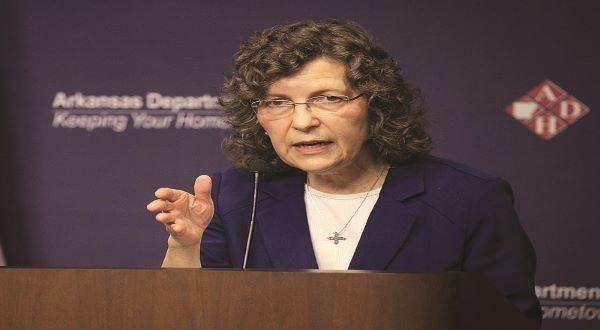
Photo: Dr. Jennifer Dillaha, chief medical officer and medical director for immunizations and outbreak response at the Arkansas Department of Health
Following the approval this week from the U.S. Centers for Disease Control and Prevention for children ages 5-11 to receive the covid-19 vaccine, doses began arriving in clinics across Arkansas.
The Arkansas Democrat-Gazette spoke with Dr. Jennifer Dillaha, chief medical officer and medical director for immunizations and outbreak response at the Arkansas Department of Health, about when doses are expected to be available, where children can get them, and potential differences in symptoms experienced after receiving the shot.
When will the vaccine be available?
Dillaha says not all locations have doses yet. Doses will be going to all Department of Health local units and providers that participate in “Vaccines for Children,” which provides vaccines to low-income children in the state. Beginning next week, Dillaha says, providers that don’t participate in the organization but wish to vaccinate children will begin receiving their doses. She adds that the University of Arkansas for Medical Science Medical Center and Arkansas Children’s Hospital should also receive doses by next week.
• The New York Institute of Technology College of Osteopathic Medicine at Arkansas State University in Jonesboro is offering pediatric doses and has immediate availability at the NYITCOM Medical Clinic, the medical school announced in a news release Thursday.
• Arkansas Children’s received 600 doses of the vaccine as of Thursday when they began distributing the vaccine, and are expected to receive more doses by the end of the week, spokeswoman Hilary DeMillo says.
• UAMS Medical Center is waiting for guidance from the Department of Health as to when it will receive doses and in what quantity, said spokeswoman Leslie Taylor. At that point, they will then decide when and where they will offer clinics, she added.
How do I get an appointment?
• Dillaha recommends parents call the clinic where they typically get their child vaccinated to see if they have the covid-19 vaccine or plan on distributing pediatric vaccines.
• Vaccines.gov can be used to search clinics that have the pediatric vaccine, but she cautioned that if not many places are listed, they might not have received their doses yet.
• Call 1-800-803-7847 to find clinics offering the pediatric vaccine near you.
• Dillaha says the Health Department will work with any school district that reaches out to them to offer school-based clinics. Some pharmacies are offering this as well, she said.
• Parents can check availability for appointments at Walmart or Sam’s Club pharmacies via online scheduler. By visiting walmart.com/covidvaccine or samsclub.com/pharmacy/immunizations, you can filter by age and find locations in your neighborhood, according to a news release from the company.
Will the side effects of the vaccine be different for children than they are for adults?
Children receiving the vaccine can anticipate similar symptoms to the ones that adults have experienced, Dillaha says. The most common symptoms, she said, may include: pain at the injection site, some redness, swollen lymph nodes on the side the vaccine was received, tiredness and muscle aches.
How many doses did the state receive?
The minimum order to send vaccines to a clinic is 300 doses, Dillaha says. Since not all clinics have the demand for that number of doses, the local health department had to receive and redistribute doses in some cases, she says.
She estimates the state program will receive about 66,600 doses, while federal programs have received approximately 40,000 doses. Dillaha says the state will have more than 100,000 pediatric doses by the end of the week, noting there are an estimated 272,000 children in the 5 to 11 age group in Arkansas.
What is the difference between the pediatric vaccine and the one adolescents and adults receive?
The formulation and training for healthcare workers is different for the pediatric vaccine than it is for the vaccine for those 12 and older, Dillaha says. The vial for the pediatric version has an orange top with an orange border on the label, while the one for adolescents and adults has a purple top with a purple border on the label, she said. It’s important that healthcare workers keep them straight, she said, because the vaccine has to be diluted and a different amount is used in the pediatric version and the dose given is different. She adds that clinics that administer the pediatric vaccine will need to train their staff to make sure proper processes are in place.
Should any group of children not get the vaccine?
If a child had a severe allergic reaction after a previous dose of this vaccine, or had a severe allergic reaction to any of the ingredients of the vaccine, Dillaha says they should not receive the vaccine.
What would you say to anyone reluctant to get their child vaccinated?
“People do not develop lasting immunity to coronaviruses,” Dillaha says. She adds that once someone gets infected, they can get it again and again. “Unless people maintain their immunity, then we will have repeated waves in our community,” she says. To keep the spread of the virus as low as possible in our community, she recommends everyone be vaccinated.
WebReadyTM Powered by WireReady® NSI










